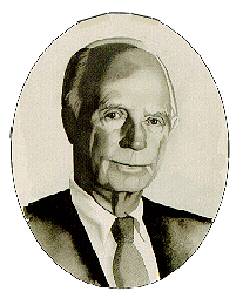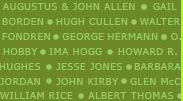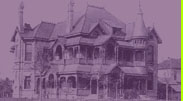WHO'S WHO - GORDON A. CAIN
 (1912-2002)
(1912-2002)
The late Gordon A. Cain was not your average entrepreneur. Most self-employed people focus their energies on one company and use that company to make a living, or maybe even a profit. Cain believed in wearing many hats and seeing that his employees realize some profit as well.
The son of Gordon Dunn Cain and Ola Arbuthnot, he was born in Baton Rouge on May 31, 1912, and grew up in Baton Rouge, Calhoun, and Rayville, Louisiana.
Cain served as a director of Texas Petrochemicals Corporation, Atlantic Coast Airlines, Inc., Agennix, Inc., and Lexicon, Inc. His resume boasted of a long and distinguished career covering diverse industries. He served as chairman of the board of Sterling Chemicals, Inc., Vista Chemical Company, Cain Chemical, Inc., and The Sterling Group.
In addition to watching over his own businesses, Cain devoted a great deal of time to the community by serving as member of the Advisory Board of the Chemical Heritage Foundation and as sponsor of the Technology and Economic Growth Program of Stanford University’s Center of Economic Policy Research. He was also director for the Cato Institute, Citizens for a Sound Economy, and the National Center for Policy Analysis and participates in Duke University’s Distinguished Speaker Program.
In 1988, he and his wife Mary established the Gordon and Mary Cain Foundation, which supports local education, social, and health projects, as well as public policy groups with limited-government, free market orientation. He was a member of River Oaks Country Club and The Bayou Club in Houston, TX, Grandfather Golf & Country Club and Linville Country Club in Linville, NC, and Mountain Lake Country Club in Lake Wales, FL.
"I’m finding it a lot more interesting to get involved in a lot of different things," he said. However, Cain, a native of Baton Rouge, La., had one goal in mind while attending Louisiana State University—to become a chemical engineer. With his degree in hand, he began a successful career working for Freeport Sulphur Company, then Merck & Company.
During World War II, Cain commanded a heavy mortar battalion in the Pacific arena landing on Leyte and Okinawa. He received two Bronze Stars and a Purple Heart. He was wounded on Okinawa. After the war, he returned to Texas and worked for Freeport Sulphur Company, Standard Perlite Company, and FMC Corporation. He came to Houston in 1955 to help organize PetroTex Chemical Company, a joint venture of FMC and Tenneco (now Texas Petrochemicals Corporation).
In 1964, he became a vice president of Conoco in charge of their chemical operations, where he built the business from $25 million in sales to $600 million.
In 1970, he resigned from Conoco and spent the next twelve years as a manager of various troubled companies. These included a synthetic rubber company in Argentina (PASA - Petroquimicas Argentina Sudamericana), an oil refinery in Alaska, a chemical company in Houston, and electronic companies in Houston and Boston. In 1984, he completed his first leveraged buyout. He bought a fertilizer business and established the Arcadian Corporation, which became a $2 billion company before it was sold in 1996.
He also bought Conoco's chemical business from Du Pont and established Vista Chemical. He formed The Sterling Group, which continued to do leveraged buyouts, buying Monsanto's Texas City plant to form Sterling Chemicals; buying six ethylene-related plants from six different companies to form Cain Chemical; buying six ethylene-related plants from six different companies to form Cain Chemical, run by his close friend and business associate Bill McMinn; and buying the Celanese polyster fibers business to form Fiber Industries.
Cain tried to leave the corporate world. Taking an entrepreneurial leap, his dream was to build, own, and operate a small chemical company. But given his background, investment bankers he approached for capital asked him to help with existing companies that were, as Cain called them, "dead end enterprises." "Before I knew it," he said, "I’d embarked on a career in running troubled companies."
He not only ran these firms—he saved them from extinction. Of the many companies Cain rescued, Sterling Chemicals, Inc. became 60 percent employee-owned. Forty-three percent equity in Cain Chemical, Inc., was owned by employees. When the company was sold, the 1,350 employee-owners received in excess of $535 million from the sale.
He did so well in turning companies around that in 1982 he founded an investment banking firm, The Sterling Group, Inc., which specializes, sponsors, and invests in leveraged acquisitions, primarily in the petrochemicals industry. It also has a penchant for leaving its companies’ employee-owners wealthy.
According to Cain, he didn’t get into the business of saving ailing firms for any reasons other than the challenge and the opportunity to help the employees. Since 1992, Mr. Cain participated in other Sterling Group investments including Mail-Well, Purina Mills, Sterling Diagnotic Imaging and Texas Petrochemicals. He helped start Atlantic Coast Airlines, helped found Lexicon Genetics and also started two other biotechnology companies still in developmental stages, Agennix and ADViSYS, Inc.
"After the companies I took over became successful, people working for them had something to look forward to," he said. "It feels good to help other people."
Gordon Arbuthnot Cain died October 22, 2002 in Houston of heart failure. He is survived by his wife, Mary Hancock Cain; two step-children, Margaret (Peggy) Weaver Oehmig, and James Weaver.






